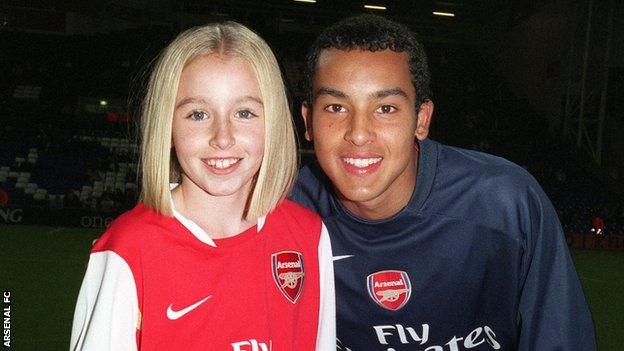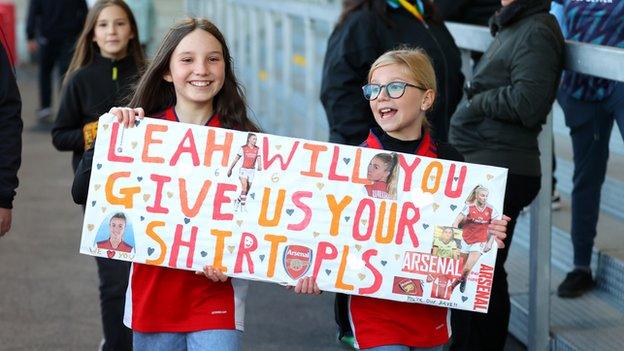Leah Williamson: The England captain with impostor syndrome
- Published

Lifelong Arsenal fan Leah Williamson interrupted a family holiday to be a mascot and meet Theo Walcott at a League Cup match in 2006
Alex Scott: The Future of Women's Football |
|---|
Live on iPlayer |
Watch on BBC One, Saturday 2 July, 22:20 BST |
Leah Williamson, whether she likes it or not, has become the face of England women's football.
Having gone from being a fan and mascot for her beloved Arsenal to a key player for the Gunners, and the first name on the teamsheet for her country, she feels like an impostor.
Her appointment as England captain for this summer's European Championship could have raised eyebrows considering the Arsenal defender's major tournament experience.
She previously had only six minutes as a substitute in the 2019 World Cup in France before landing England's top job.
But the lack of naysayers speaks volumes for the 25-year-old's standing within the game.
"Things have changed a little bit, haven't they?" says Williamson, who was yet to make her senior international debut when the last Euros took place in 2017 but has now made 29 appearancesfor the Lionesses.
"Somebody said to me the other day that if I start that opening game - that would be my first start in a major tournament. Now I'm doing it as captain.
"I've not maybe had the opportunities in the past, but I've been building to be ready for this now. It's the next bit of the journey, that's how I look at it."
During 60 minutes in her company strolling the streets of north London, nothing is off limits for a player England manager Sarina Wiegman called a "great leader" when giving her the captain's armband in April.
Talk of where the women's game is heading is why Williamson is chatting with Arsenal legend Alex Scott for a BBC documentary focusing on the future of the game in this country - and the world.
She tells Scott: "When I was younger, I was the girl that had my role models in football - you, Kel [Kelly Smith], Yanks [Rachel Yankey]. So now to be in that position, I feel - what's the word - a bit of an impostor because I don't see myself anywhere near what you guys were when you were playing.
"Now somebody's looking up to me. They come to watch me week in, week out, so I'm a bit like, 'tough shoes to fill'."
Her appointment as the replacement for long-term captain Steph Houghton was greeted warmly by her England team-mates.
Millie Bright described her as someone who "leads by example" and a "very mature individual" on and off the pitch. Defender Demi Stokes highlighted Williamson's "consistent" personality as a key trait, while Houghton said she was "a driven leader" with "all the attributes an England captain needs to be successful".
'We don't have to graft'
Williamson is just 25 but even in her time in the game the landscape has changed immeasurably.
As a youngster she didn't know whether making a living as a footballer was even feasible, but now top players can expect to earn approaching £500,000 a year in wages and commercial deals - and a home Euros is only going to increase the earning power of the Lionesses.
"My dad always said to me that he hoped there would be a wage, so that I could be a footballer as a job," says Williamson.
"The game has blown up. The opportunities that now come with it, obviously we benefit from them, but it's never been what I thought I was going to grow up into - the complete landscape has changed.
"Now we are all footballers and that's what we do - we don't have another job, we don't have to graft. I don't know what I expected, but it wasn't this. It wasn't people recognising you on the street."

Arsenal fans hold a banner asking for Leah Williamson's shirt
Speaking during the break between the end of the domestic season and joining up with England, Williamson will shortly be heading to Italy for a Gucci fashion show - another opportunity she never envisaged. "People will invite you because you have influence in society and I don't suppose I ever saw myself being in that position," she says.
But with the growing opportunities and media coverage comes added scrutiny, something the England players are all too aware of.
‘We’re not going anywhere’ - how female footballers are tackling online trolls
Williamson says conversations on how to approach social media during the Euros - "posting, not scrolling" and "absolutely" avoiding the comments - have taken place in the Lionesses camp.
"At the 2019 World Cup, I didn't play, so I was fine," she explains. "I was on every [social media platform], I didn't care."
Williamson says this time she will be much more careful, though will still use it: "I'll be posting and I want to be engaging, because it's a nice time of my life and I want to celebrate with my people and share my story."
Players had originally got on board with social media to help grow the game, she says, "but a lot of the girls have been hit hard by it".
"They've had to go backwards to remove themselves from it. And I don't know many now that are involved on their socials, because it's nasty."
Many female footballers face a constant stream of messages from people who want to put women's football down. "I think women footballers take the patronising personally, because it's my game, I'm here to protect it," says Williamson.
"I don't particularly like watching fencing, but I don't tweet to say that I don't like it.
"If you are a football fan, not a rugby fan, you don't want rugby to not exist. You just think that football's better, so you just watch football. But if it's women, then it means we need to remove it.
"But we're not going anywhere," she adds.
Williamson negotiates the wide-ranging conversation with all the calmness that England head coach Wiegman pointed to when she announced her appointment as captain.
But the 25-year-old becomes like a wide-eyed child when she talks about the world record crowds of more than 90,000 that watched Barcelona's Women's Champions League quarter-final and semi-final matches at the Nou Camp.
"I didn't think I'd see that in my lifetime," she says. "I'm jealous. It would have been unbelievable to play in."
When it comes to a home Euros, where England's three group matches and the final at Wembley have all sold out, that excitement spills over again.
"I think there's always been a direct correlation between success in a tournament and then what happens to the league off the back of it," she says. "I'm excited to see where we go and how much it can give to the game in this country.
"If you had told me as a kid that I'd be playing at Old Trafford, which is sold out for England in a home Euros, I would have bitten your hand off. It gives me chills because I just think that it is literally incredible."
And with that, Williamson is off. Off to catch a flight to Italy to start her summer which could end with her becoming the first England football captain to lift a major trophy since 1966.
Now those are tough shoes to fill.

Ancient Egypt's ultimate 'yummy mummy': She reigned for over 20 years but why did history try to erase her?
Boost your memory and heart health: Find out how a nap could slash your risk of heart attack by half and have an impact on your brain
